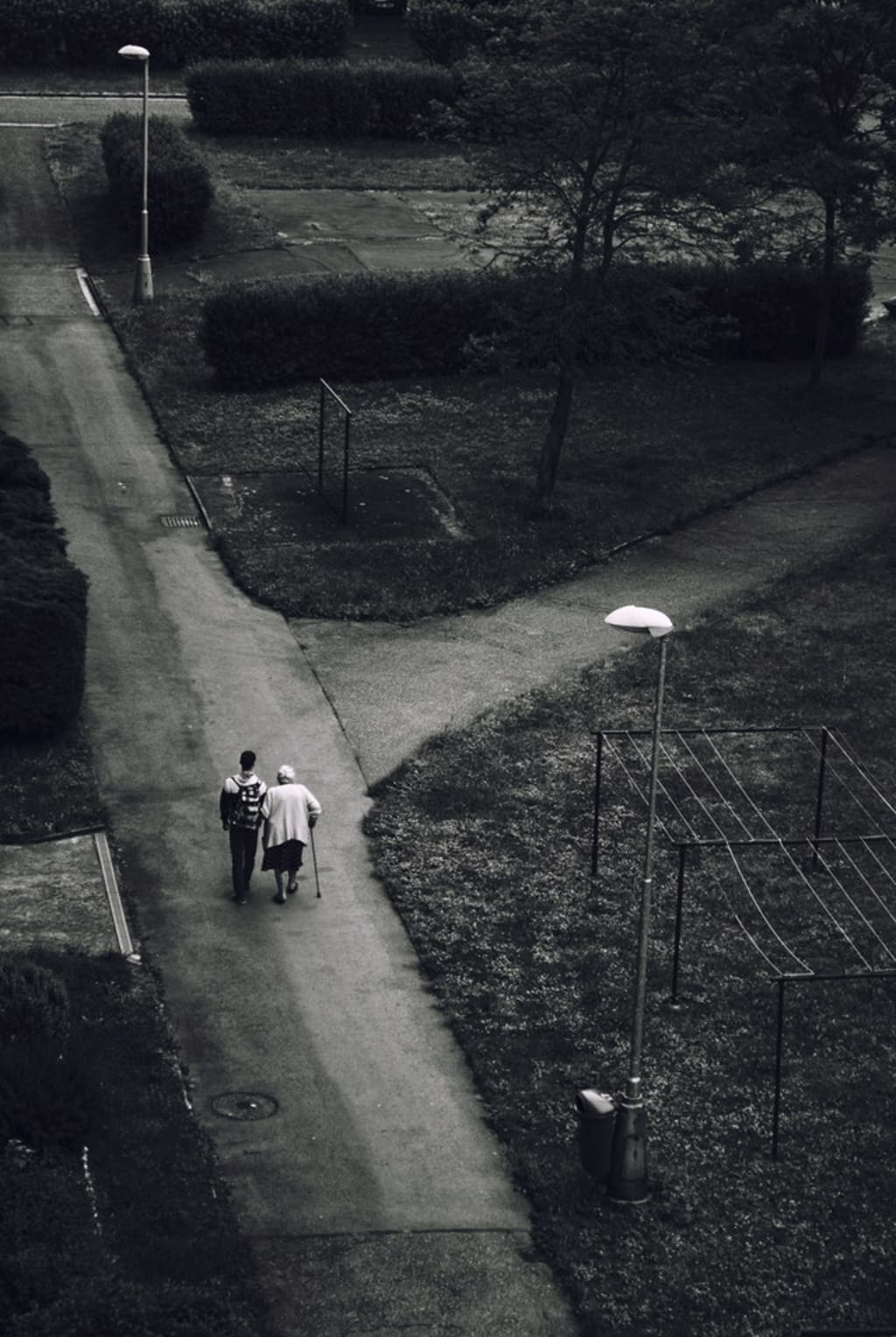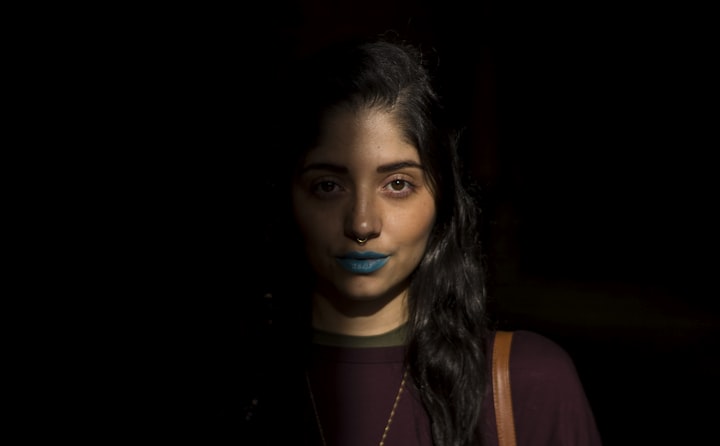
Ethan had the dream again last night.
In the dream, he always sits by the window, gazing out across a forest. The wind gently eases through the distant trees. The fingers of his right hand are curled around a pen, poised over a little black notebook — but before he can look down to see what he’s written, he wakes up.
He longs for that peace and quiet now as stands on the train platform, crushed by commuters. His bank balance sits in his vision like an accusation. Ethan can’t take his eyes off of it. Twenty thousand dollars. He hadn’t expected it to come through so quickly. Sitting against the bright station walls, the five digits are stark, heavy; as he squints at them, a headache throbs behind his eyes. He couldn’t afford his last annual calibration, crushed by years of student debt and bad credit. But things will be better now, he tells himself, and ignores how his stomach sits heavy beneath his lungs.
For twenty thousand dollars, he can ignore a lot.
The subway is even more congested than usual; the implants in his ears chime with apologies from several different transit companies, all blaming each other for delays. When a train finally arrives at the station, he almost loses his briefcase amongst the rush to get on. He ends up shoved against an electronic window playing advertisements between scenic photographs.
None of them depict a forest.
Ethan gets off two stops later and makes his way up to street level. His destination is only three minutes away by foot. The small apartment building is easy to miss amongst the shadows of surrounding skyscrapers, not unlike strangers passing a beggar. When the security guard sees the briefcase, he waves Ethan through the door. Ignoring the overwhelming smell of bleach, Ethan takes the elevator up and does his best not to think about what he’s about to do. But after far too short a time, the elevator door opens, and Ethan has no choice but to walk down the hallway until he comes to the right number. His briefcase is suddenly heavier than it was a moment ago; he feels nauseous.
He hadn’t planned on this. The job had been unexpected; the position had suddenly opened up, and nursing pays a pittance, so here he is — twenty thousand dollars richer every time he makes a visit. What he’s about to do for this woman is a kindness. That’s what his new boss called it this morning.
A kindness.
He can’t bring himself think her name.
Ethan opens the door, and steps inside. There is a tiny, wizened old lady with translucently white hair sitting by the window. The fingers of her right hand are curled around a pen.
She’s writing in a little black notebook.
“You must be the collector,” she says without looking up. “Sorry, I’m almost done.”
The only sound is her pen scratching against paper. He stands there and watches her steady hand. From where he stands, he can’t see what she’s writing but her words are lovely things; gentle, cursive loops against thick, unlined paper. He desperately wants to read them. A too-loud chime from his implants reminds him that his rent is overdue.
His head is pounding.
“What’s your name?”
“Ethan,” he says.
“Ethan,” she says, and finally looks up. Her eyes are remarkably clear, her gaze precise; Ethan feels like there is nowhere to hide. “You’re awfully young. How old are you?”
“Twenty nine.”
“Awfully young indeed,” she says, and smiles. The motion is like a stone dropped in still water; it sends the wrinkles of her face cascading upwards into kindness. He wants to be sick. The chime in his ear sounds again, loud enough to make him cringe, and in the middle of his vision, a turgidly red, blurry warning informs him that his weekly debt payment is about to be withdrawn from his account. It’s all too much; he clumsily thumbs at the insertion scars behind his ears, trying to find the little bump that serves as a switch.
It feels like his skull is about to split in half.
“Is it your implants?”
Ethan is in too much pain to do anything besides nod. Tucking the notebook into her cardigan pocket, she hobbles to the cupboard above the kitchen sink. Straining upwards, she opens the door. She’s not tall enough to see inside, and it’s clear in the pinch of her brows that the movement is paining her.
“Let me help,” Ethan manages to say, putting the briefcase down. Joining her, he can see what she must be looking for: nestled amongst the tins of tea and biscuits is a small leather bag. He passes it to her, and she gestures for him to sit. He hesitates.
“Used to be a neuro-engineer,” she says. “I’ve calibrated thousands of the things.”
He’s read her medical records. He knows about the osteosarcoma, knows about the cancer filtered through her marrow. It feels almost impossible that she should exist beyond these things. But here and now, she looks at him with the patient professionalism of a doctor; it’s only natural that he sits with the quiet obedience of a patient. She takes several little tools from the bag: a small penlight, a doctor’s eyeglass, and a slim metal stick — a calibrator.
“Try not to blink,” she says, fitting the eyeglass to her right eye and switching the penlight on. With the tips of her fingers, she holds up his eyelid and shines the light into his pupil, examining it intently. Her hands are soft and light; she smells like soap and biscuits. He struggles not to blink as she switches to the other eye. Then she lightly presses the scars behind his ears. The alert urges him to proceed with the collection, but he ignores it.
“They’re not inflamed,” she concludes. “Must be a software issue. When were they last calibrated?”
“Year before last. Couldn’t afford it.”
“It’s very easy to fix. I can do it right now.”
“Are you sure?”
“Of course. Close your eyes, dear.”
He does, and she presses the calibrator to the side of his face, cool and unfeeling. He can feel his implants rebooting; his hearing fades in and out, and if his eyes were open, his vision would do the same.
“How long have you been a euthanist?” she asks.
“Since this morning,” Ethan replies, his voice strange and tinny to his own ears.
“Oh, my. It’s been a long time since I was someone’s first, but I promise I’ll be gentle.”
The joke is so unexpected that Ethan laughs; cracking open an eye, he finds her looking pleased.
“Did you always want to go into medicine?” she asks. He closes his eyes again. Her voice sounds muffled; she adjusts the calibrator.
“No,” he says. “When I was a kid, I always wanted to write.”
“And why didn’t you?”
“Doesn’t pay the bills. Besides, I don’t have anything worth writing about.”
“Everyone has something worth writing about.”
“Not me.”
“I think you’d be surprised,” she says gently.
“What about you? What were you writing?”
“Thoughts,” she says. “Feelings. I’ve always liked to write whenever I’m feeling something too big for my body. Open your eyes.”
He does, and the debt payment, now a muted red, sits neatly out of the way in the corner of his vision; the overdue rent notice chimes again, but at a far more tolerable level. Unhurried by pain, he easily finds the switch behind his ear and mutes the implants.
His headache is gone.
“Is that better?”
“Yes,” he says around the lump in his throat. “Yes. Thank you.”
“My pleasure,” she says. “Now — and I can’t believe I get to say this to such a handsome young man — would you help me into bed?”
Ethan laughs, and again, she looks pleased. He assists her to her bedroom; she moves slowly, disjointed and trembling beneath his touch. Amongst the medical equipment carefully set up around the bed, there are several photographs of people he assumes are family and friends. Long gone, Ethan thinks — hopes, even, because the thought that they are alive and not here with her is a cruelty that cracks something asunder in his chest. It should be someone else doing this. Someone who knows and loves her.
“Tuck me in, would you?” she asks. He takes his time, precisely folding the quilt to her waist and smoothing out the creases. Before Ethan can ask, she offers her arm to him; he rolls the sleeve of her cardigan above her elbow. Her skin is liver-spotted and paper-frail, veins sitting in stark relief against bones and tendons. A cannula sits in the crook of her arm, neatly splitting her flesh. Ethan finally unlocks and opens the briefcase. Several vials and needles sit inside; he withdraws what he needs.
“Are you sure?” he asks her.
“I’m sure, dear. I’ve had quite enough.”
“I’m sorry,” he whispers.
Her gaze is kind. “Don’t be. I’m the one that called you here, remember?”
A kindness, he reminds himself, and lines up the needle. As he slots the syringe into her body, he can feel every single muscle and tendon in his hand clench with the motion. The mechanics of it are so straightforward — a simple depression of his thumb. The time and effort it takes to end her life feels insultingly small; not even three seconds, and the barrel of the needle is empty. After he packs and closes the briefcase, she lays her hand over his. Quite automatically, he places his other hand on top of hers. Her hand is impossibly light between his own.
“Would you do me a favor, Ethan?” she asks.
“Of course.”
“There’s a spare notebook and pen in my desk. Write something with them.”
“I couldn’t—”
“You can, and you will,” she says calmly. “Promise me.”
“I promise,” he says. Even as he says it, her eyes have begun to flutter shut; he can feel her fingers loosen between his own.
“Thank you,” she murmurs, then sighs like someone sitting down after a long day of being on their feet.
And just like that, she's gone.
Ethan sits there, her hand between his, and something hot and wet rolls down his cheek; he realizes he’s crying. He remains by her side until the shadows have shifted and his legs ache from the stillness. Eventually, he stands up and walks from her room to the desk, opening the drawer and removing the little black notebook and pen. Sitting down, he lays them on the desk and then hesitantly turns to look out the window. There's no forest, but even from here, he can see the freshly-planted saplings lining the city streets. He opens the notebook and looks down at the pages: crisp; beautiful; bare.
And finally, finally, he writes.
About the Creator
Laura Habib
emerging writer, employed editor. lover of: creative writing, good booze, and better books.






Comments
There are no comments for this story
Be the first to respond and start the conversation.